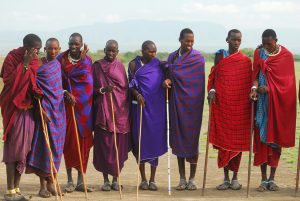Wonderinhg How Many Wives Can A Maasai Have? Well, The Maasai, renowned for their vibrant culture and rich traditions, have long been a subject of fascination.  Among the various aspects that capture attention is their practice of polygamy. In this article, we will delve into the intriguing question: “How Many Wives Can a Maasai Have?”
Among the various aspects that capture attention is their practice of polygamy. In this article, we will delve into the intriguing question: “How Many Wives Can a Maasai Have?”
How Many Wives Can A Maasai Have FAQs
- Q: Are all Maasai men allowed to have multiple wives? A: While polygamy is generally accepted among the Maasai, not all men choose to have multiple wives. Individual circumstances and personal preferences play a role in determining whether a man will have more than one wife.
- Q: Do Maasai women have a say in the decision to enter into a polygamous marriage? A: Maasai women often have limited influence in the decision to enter into a polygamous marriage. Traditional practices and cultural norms heavily favor the desires and decisions of the male members of the community.
- Q: How do Maasai wives manage relationships within a polygamous marriage? A: Maasai wives in polygamous marriages establish their roles and hierarchies within the family unit. While jealousy and competition may arise, women often find ways to cooperate and support one another in the best interest of the family.
- Q: Are there any legal regulations on polygamy among the Maasai? A: Polygamy is legal in some African countries where the Maasai reside. However, laws and regulations regarding marriage and polygamy can vary, and it is essential to consider the specific legal framework of the country in question.
- Q: Is polygamy still prevalent among the younger generation of Maasai? A: The prevalence of polygamy has decreased among the younger generation of Maasai due to various factors, including education, modernization, and exposure to alternative cultural practices. Many younger Maasai individuals are choosing monogamous marriages instead.
Reviews :How Many Wives Can A Maasai Have
The Maasai people, an indigenous community primarily residing in East Africa, have a cultural heritage deeply rooted in pastoralism. Their traditions and way of life have been shaped by centuries of nomadic existence, and marriage holds significant importance in their society.
Traditional Maasai Marriage Practices
In traditional Maasai culture, marriage is a solemn union that symbolizes the alliance between families and the continuity of lineage. It is often arranged by the parents, with the consent of the individuals involved. The ceremony itself is a festive occasion, marked by rituals, dancing, and feasting.
Polygamy in Maasai Society
Polygamy, the practice of having multiple spouses, is widely accepted within Maasai society. It is not uncommon for a Maasai man to have more than one wife. Polygamy serves as a symbol of prestige, wealth, and fertility among the Maasai, reflecting a man’s ability to provide for and support multiple households.
Factors Influencing the Number of Wives
Several factors influence a Maasai man’s decision to have multiple wives. Social standing, economic stability, and the desire for a large family are among the primary considerations. Additionally, the availability of resources, such as livestock and land, can impact a man’s ability to support multiple households.
Benefits and Challenges of Polygamy
Polygamy in Maasai society presents both benefits and challenges. On one hand, it allows for the expansion of family networks and the sharing of responsibilities among wives. It also enhances a man’s social status within the community. However, polygamy can give rise to jealousy, competition, and unequal power dynamics among wives.
Women’s Perspective on Polygamy
While polygamy is accepted and practiced in Maasai culture, it is essential to consider the perspective of the women involved. Maasai women in polygamous marriages often face challenges related to division of attention, limited resources, and societal expectations. However, it is crucial to recognize that perspectives and experiences can vary among individuals.
Changing Dynamics and Modern Influences
In recent years, Maasai society has experienced significant changes due to factors like education, globalization, and cultural shifts. As access to education increases and modern ideas infiltrate traditional practices, younger generations are reevaluating the merits of polygamy. This shift has resulted in a decrease in the number of polygamous marriages among the Maasai.
Conclusion
In conclusion, polygamy remains an integral part of Maasai culture and continues to shape their social fabric. The practice reflects the values, beliefs, and economic considerations of the community. While polygamy comes with its benefits and challenges, it is important to appreciate the complexities and cultural significance it holds within Maasai society.
Recent Posts
Top Semiconductor Companies In Europe – Field-Tested Choices
Europe has a long history in semiconductor innovation, producing advanced chips for automotive, industrial, and consumer electronics. The region’s strong engineering talent and research...
Taiwan is a global leader in the semiconductor industry, producing some of the most advanced chips used worldwide. The country’s strong technology infrastructure and skilled workforce make it a hub...